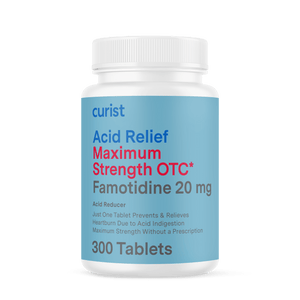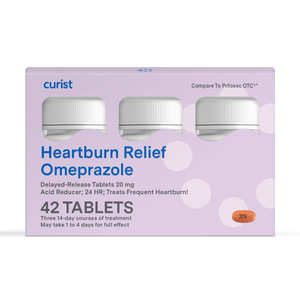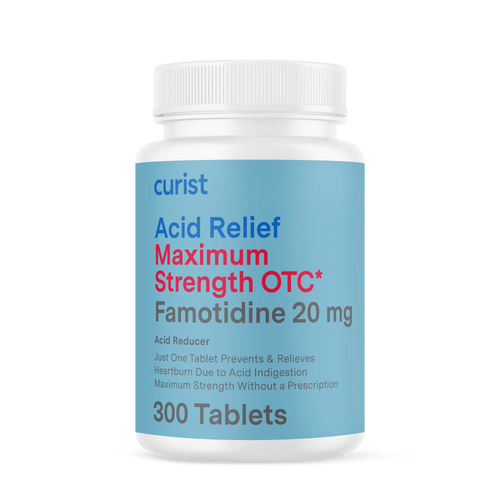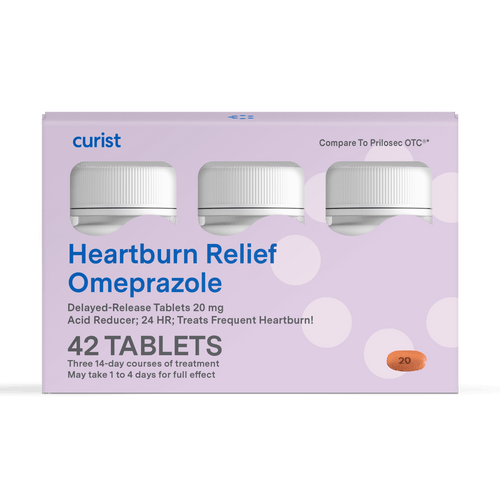By Cindy Diep, The University of Texas at Austin College of Pharmacy
Curist delivers over-the-counter medicines to your door at a fraction of the price of traditional brands. We hope everyone stays safe and healthy during this time.
This article compares famotidine and cimetidine, two common treatments for heartburn and acid reflux. By exploring the nuances of these medications, this article offers insights to aid you in selecting the most suitable option for acid reflux relief.
Are Famotidine and Cimetidine the Same Thing? How are Cimetidine and Famotidine Similar?
Famotidine and cimetidine are not the same thing, but they do belong to the same class of medications known as histamine-2 receptor antagonists. Both famotidine and cimetidine work by blocking histamine H2 receptors in the stomach to reduce the production of stomach acid. They are both used to treat conditions related to excess stomach acid production, such as heartburn and gastroesophageal reflux disease (GERD). In addition, famotidine and cimetidine are both available over the counter.
What are the Differences Between Famotidine vs Cimetidine?
Famotidine and cimetidine have several differences. In general, famotidine is considered more potent and is effective at lower doses compared to cimetidine. Famotidine also has a longer duration of action compared to cimetidine. A single dose of famotidine typically provides relief for up to 12 hours, but cimetidine typically lasts 6 hours and needs to be taken multiple times a day.
Famotidine tends to have fewer side effects compared to cimetidine. A potential adverse effect of famotidine may be acute interstitial nephritis, which is a kidney injury caused by inflammation. However, cimetidine may cause more adverse effects, such as inflammation of the pancreas and colon, damage to the optic nerve, and a life-threatening skin disorder. Cimetidine also has interactions with CYP450 enzymes, which affects the chemical alteration of drugs within the body. Therefore, cimetidine has drug-drug interactions with warfarin, phenytoin, theophylline, and more, meaning it cannot be taken together with these drugs. In general, famotidine is preferred over cimetidine, but it is essential to consult a healthcare professional to determine the most suitable treatment option.
Can I Switch from Famotidine to Cimetidine? Can I Switch from Cimetidine to Famotidine?
Switching from famotidine to cimetidine or cimetidine to famotidine is possible, but it is important to do so under the guidance of a healthcare professional. In very rare cases, patients switching to famotidine from cimetidine may experience delirium. Always follow your healthcare provider’s recommendations and closely monitor your symptoms when transitioning between medications.
What Are the Advantages of Famotidine Over Cimetidine? What Are the Advantages of Cimetidine over Famotidine?
Famotidine is generally stronger and has a longer duration of action than cimetidine. Famotidine’s effects usually last up to 12 hours, while cimetidine usually lasts around 6 hours with a single dose. Famotidine also tends to have fewer side effects and lower potential for drug interactions compared to cimetidine.
While famotidine is generally considered superior to cimetidine in many aspects, there are a few situations in which cimetidine may be more advantageous. In some cases, cimetidine may be less expensive compared to famotidine. In certain regions, cimetidine may be more readily available compared to famotidine.
Can I Take Famotidine and Cimetidine Together? Is it OK to Take Cimetidine in the Morning and Famotidine at Night?
It is generally not recommended to take famotidine and cimetidine together. Both famotidine and cimetidine belong to the same class of medications and when taken together, they can have an additive effect of reducing stomach acid production. This can increase the risk of side effects and adverse effects, such as dizziness, headache, and GI disturbances. Taking both together may also increase the risk of drug interactions associated with these medications.
Taking cimetidine in the morning and famotidine at night may be appropriate in some cases, but it is important to do so under the guidance of a healthcare professional. There is limited data to support this approach.
Which is Stronger: Cimetidine or Famotidine?
Famotidine is generally considered to be stronger than cimetidine in terms of its potency and duration of action. It achieves greater acid-suppressing effects at lower doses and a single dose typically provides relief from heartburn for up to 12 hours. In contrast, cimetidine only lasts up to 6 hours.
Which is Best for Heartburn or Acid Reflux: Famotidine or Cimetidine?
The best medication for heartburn or acid reflux depends on individual factors and responses. However, famotidine is generally the preferred option over cimetidine because of its greater potency, longer duration of action, lower risk of side effects, and lower potential for drug interactions. Consult with a doctor to determine the most suitable treatment option for your specific needs.
Which is Best for Long-Term Use: Famotidine or Cimetidine?
Over-the-counter famotidine and cimetidine should not be used for more than two weeks unless instructed to do so by your doctor. For long-term use, famotidine is typically preferred due to its better safety profile, lower risk of side effects, and lower potential for drug interactions. However, individual responses can vary, so speak with a healthcare professional to see which is the best option for long-term use for you.
Which is Best for Ulcers: Famotidine or Cimetidine?
Current guidelines recommend proton-pump inhibitors (such as omeprazole) over histamine-2 receptor antagonists (such as famotidine and cimetidine) to treat ulcers. However, if you are comparing famotidine or cimetidine for treating ulcers, famotidine is typically preferred over cimetidine. Studies have shown that famotidine is more potent than cimetidine for healing and preventing ulcers. It also has a longer duration of action and better safety profile.
Is Famotidine Safer than Cimetidine? Is Cimetidine Safer than Famotidine?
Famotidine is generally safer than cimetidine for various reasons. One reason is that famotidine tends to have fewer incidences of side effects compared to cimetidine. Cimetidine is more commonly associated with side effects such as dizziness, confusion, and hormonal imbalances. In addition, famotidine has fewer drug interactions. Cimetidine has CYP450 interactions and inhibits the metabolism of various medications, leading to increased levels of those drugs in the body or increased risk of adverse effects. Famotidine is also considered safer than cimetidine in certain populations, such as the elderly. However, it is essential to note that both famotidine and cimetidine are generally considered safe when used appropriately under the guidance of a healthcare professional.












